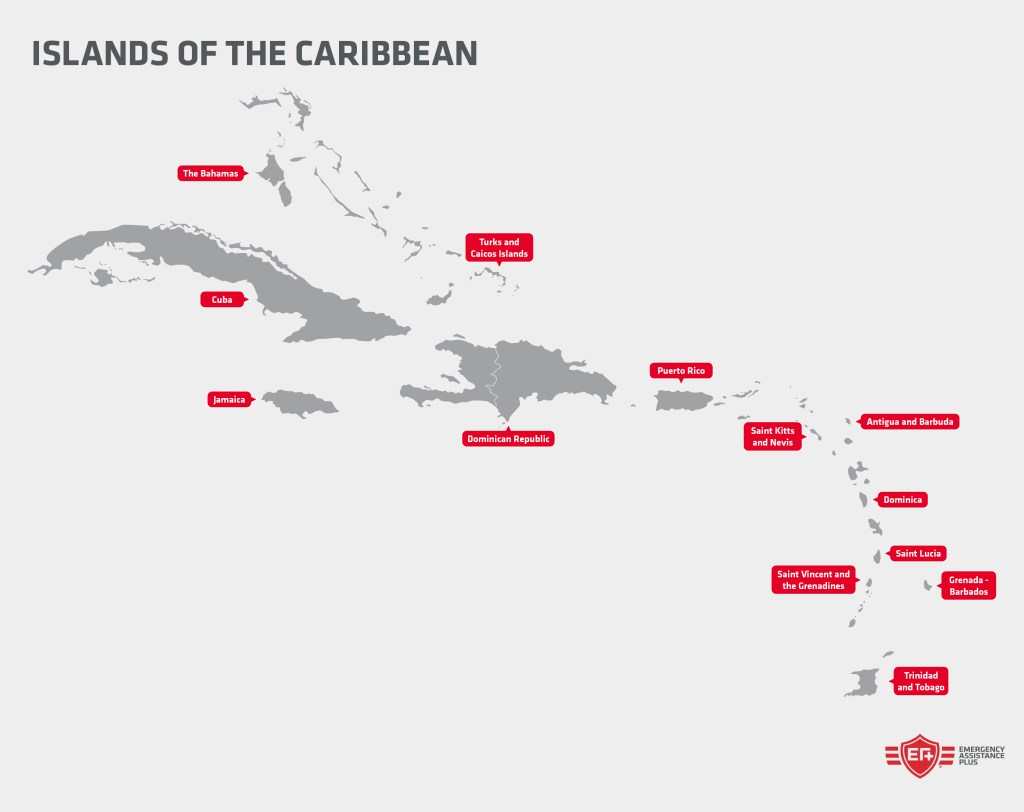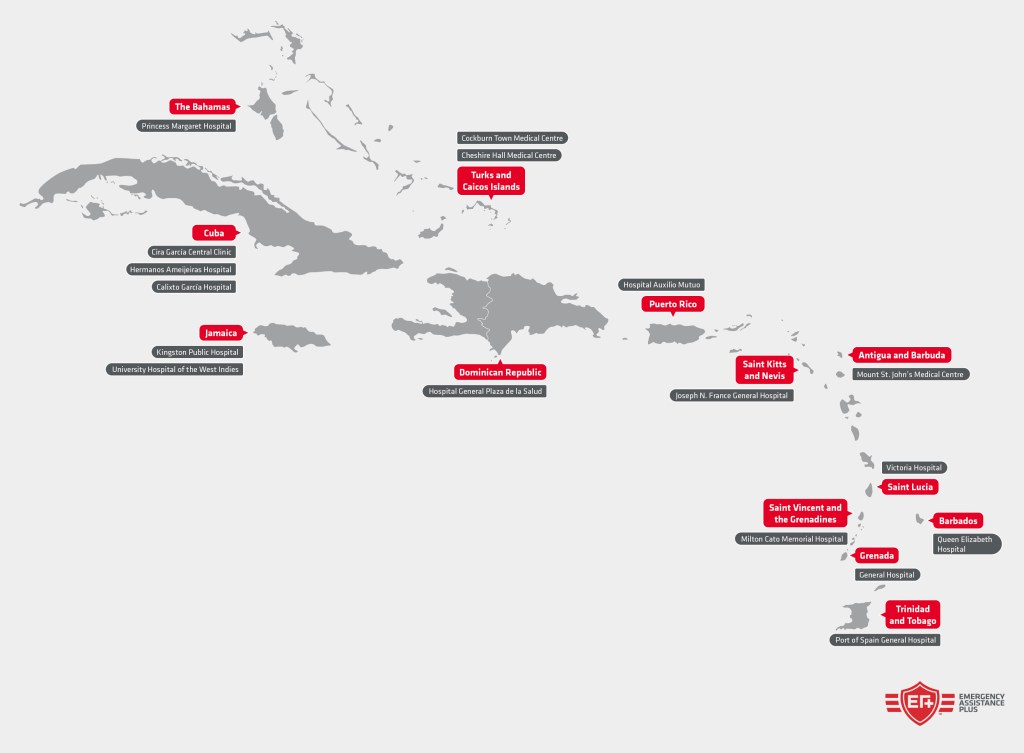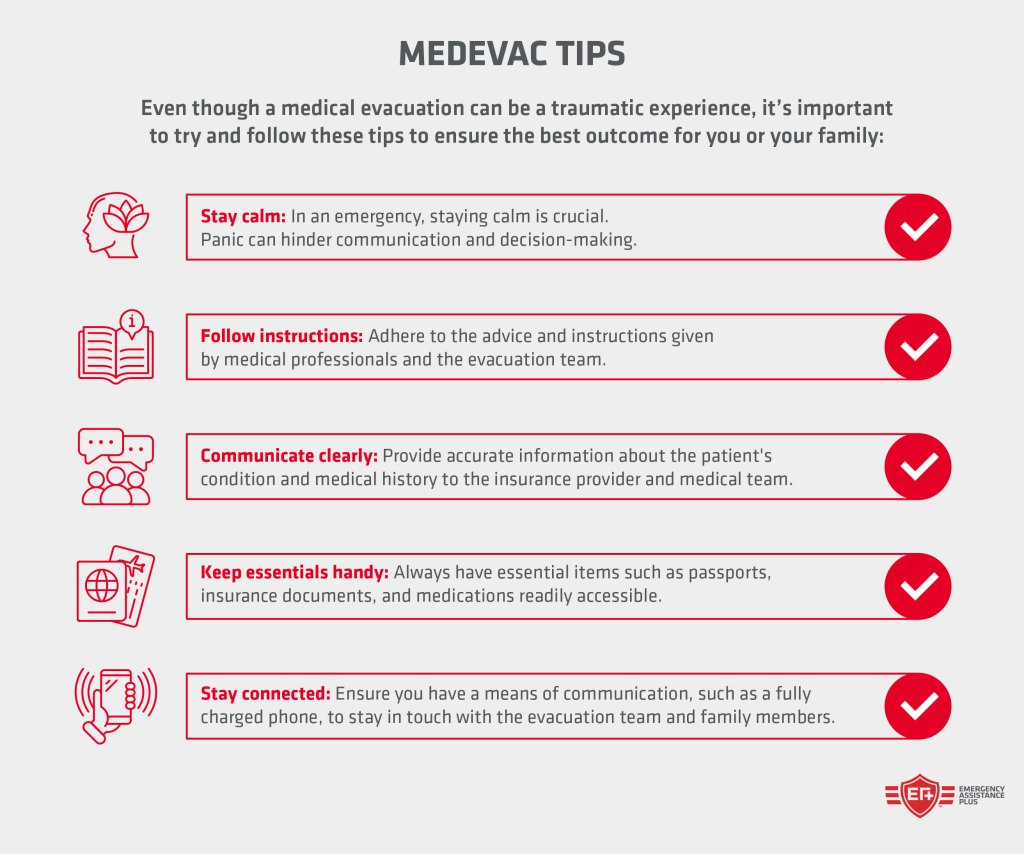Traveling to the Caribbean is a dream, but medical emergencies can occur. Our guide helps you arrange medical evacuation for prompt, effective care.
Published on July 29th, 2024 in Medical Evacuation, Travel Tips
Traveling to the Caribbean can be a dream vacation with its stunning beaches, exotic culture, and beautiful weather.
If unforeseen medical emergencies arise however, being prepared to handle such situations is crucial. Knowing how to arrange a medical evacuation from the Caribbean can make a significant difference in ensuring that you or your loved ones receive the necessary medical care promptly.
This guide will provide you with essential information on how to manage a medical evacuation efficiently and effectively.
But before we get started, let’s clarify the locations we’re going to discuss.
Caribbean geography
The Caribbean is a region consisting of the Caribbean Sea, its islands, and the surrounding coasts.
It is located southeast of the Gulf of Mexico, east of Central America, and north of South America. The region comprises more than 700 islands, islets, reefs, and cays.
For the purpose of this article, we’ll stick to the island nations (excluding Venezuela, Colombia, Belize, Guyana, Suriname, and French Guiana on the mainland of Central and South America).
So we’re talking about:

What you need to know about medical evacuation
Medical evacuation, often referred to as medevac, is the process of transporting a patient to a medical facility that can provide the necessary treatment, which may not be available locally.
In the Caribbean, this often means transferring patients to hospitals in the United States or other countries with advanced medical care facilities. Medevac can be done via air ambulance, commercial flights with medical escort, or other specialized medical transport services.
If medical evacuation isn’t covered through your health insurance, travel insurance policy, or travel assistance membership, it can be very expensive. This article on medical evacuation costs goes into great depth on that topic.
If you’re new to medevac, you may want to check out these related articles:
Now that you have some background, let’s get into the details of acquiring medevac services in the Caribbean.
Preparing before you travel
Every good trip starts with preparation, and medevac is no different. Consider taking these extra steps before your island vacation and save yourself a ton of headaches should the need for medevac arise.
Travel assistance
If you’re even remotely concerned about a possible medical emergency, consider a membership with Emergency Assistance Plus (EA+) for added peace of mind. With EA+, we handle the whole process of medical evacuation, repatriation, and companion assistance. Consider this the ‘done for you’ option when it comes to medevac and all related concerns.
Travel insurance
You can also consider comprehensive travel insurance that covers medical evacuation. Some policies specifically cover air ambulance services, while others may offer coverage for commercial flight medical escorts.
Keep in mind that with travel insurance, you’ll likely have to pay upfront out of pocket for these services, then file a claim to be reimbursed at a later date.
Know your health conditions
If you have pre-existing medical conditions, consult your doctor before traveling. Ensure you have all necessary medications and medical supplies. Carry a letter from your doctor detailing your condition and treatment plan, along with their permission to travel if such pre-existing conditions may require it.
Emergency contacts
Keep a list of emergency contacts, including local emergency numbers, your country’s embassy or consulate, and your insurance provider’s emergency hotline.
Research local medical facilities
Familiarize yourself with the nearest hospitals and medical centers at your destination. Knowing where to go in case of an emergency can save valuable time.

Note that some of these medical facilities may or may not be suitable for all types of treatments. EA+ can help you locate the nearest suitable medical facilities and provide assistance in an emergency.
Steps to arrange medical evacuation
If the worst happens, here’s how to react in the moment to ensure you get the best possible outcome.
Assess the situation
In the event of a medical emergency, the first step is to assess the severity of the condition. If immediate medical attention is required, get to the nearest hospital or clinic.
Consult with local medical professionals
Local doctors can assess a patient’s condition and recommend whether medical evacuation is necessary. They can also provide medical reports that will be crucial for the evacuation process.
Contact your insurance provider
Call your travel insurance provider’s emergency hotline. They can guide you on the next steps and help coordinate the evacuation process. Provide them with all necessary information about the patient’s condition and location. With an EA+ membership, one call is all you need to make to begin the process of arranging and providing your evacuation to a facility that can properly treat you.
Coordinate with evacuation services
If evacuation is deemed necessary, your insurance provider will coordinate with air ambulance services or commercial flight medical escort providers. These services include a medical team and specialized equipment to ensure safe transport. Note that this can take time to coordinate, so contacting your provider, trip insurance, or trip assistance company is necessary as soon as possible.
Prepare documentation
Gather all necessary documents, including medical reports, travel insurance details, passports, and any other relevant paperwork. This will facilitate a smooth evacuation process.
Stay informed
Keep communication lines open with your insurance provider, the medical team, and the evacuation service. Stay informed about the evacuation timeline and any instructions provided by the medical team.
Note that Emergency Assistance Plus offers comprehensive evacuation coordination, ensuring a seamless process. In other words, you can skip all these steps and just call the number on your EA+ card and we’ll take everything.
Choosing the right evacuation service
There are several types of medical evacuation services available. Generally speaking, the attending healthcare professional will determine which service is best for your situation.
Air ambulance
This is a specially equipped aircraft designed for medical emergencies. It comes with a medical team and advanced life support equipment. Air ambulances are the quickest and most efficient way to transport critically ill patients.
Commercial flight with medical escort
For less critical conditions, a commercial flight with a medical escort may be a viable option. This involves a nurse or doctor accompanying the patient on a regular flight, providing necessary medical care during the journey.
Ground ambulance
If the patient needs to be transferred to a nearby location within the same island, a ground ambulance can be used. This is often the first step before an air evacuation.
Tips for a smooth evacuation process

Even though a medical evacuation can be a traumatic experience, it’s important to try and follow these tips to ensure the best outcome for you or your family:
Costs and insurance coverage
The cost of international air ambulance flights can range from $50,000 to $150,000 or more, which is significantly higher than domestic flights, partly due to additional costs like landing fees, handling fees, and international travel paperwork.
Comprehensive travel insurance that includes medical evacuation coverage can also mitigate these costs. When purchasing travel insurance, ensure that it covers the specific regions you plan to visit and includes high coverage limits for medical evacuation.
Apart from travel insurance, some travel assistance memberships can help you with both the costs and logistics of medical evacuation.
Comprehensive travel assistance services, like those offered by EA+, provide 24/7 support through a dedicated emergency hotline. We arrange medical evacuations and transportation to appropriate facilities or home when needed.
Additionally, we offer medical and travel assistance, such as consultations, lost prescription replacement, and travel information, along with non-medical services like lost baggage assistance and emergency cash transfers.
This ensures travelers receive timely, effective help, enhancing their safety and peace of mind during their journeys.
Medical emergencies can happen anywhere, and being prepared for a medical evacuation from the Caribbean can make all the difference in ensuring you receive timely and appropriate care. By understanding the process, having comprehensive travel insurance, and knowing the steps to take, you can navigate a medical emergency with confidence and peace of mind.
For comprehensive travel assistance and to ensure you are covered in case of a medical emergency, consider enrolling in a membership with Emergency Assistance Plus.
Here’s a story from the Jones family, and EA+ member who needed emergency surgery while on a cruise in the Caribbean:
“After his hospital release, EA+ arranged transportation home with a nurse escort all the way, including from the airport in San Diego about 50 miles to our home. They even brought our luggage into the house.” said Mrs. Jones.
Travel with confidence knowing Emergency Assistance Plus (EA+) has you covered. Our comprehensive travel assistance program ensures you’re never alone in an emergency, providing 24/7 support for medical evacuations, transportation home, and other critical services, so you can focus on enjoying your journey.
Safe travels and stay prepared!

Should a medical emergency derail your travel, Emergency Assistance Plus® (EA+®) has you protected no matter where you are.
Learn MoreRelated resources

Travel Tips
Dealing with a hospital visit in a foreign country doesn’t have to be overwhelming. Here’s how to navigate medical emergencies abroad confidently.
Continue Reading
Destinations
Dreaming of an African safari? We’ve got you covered—planning, logistics, destinations, and more!
Continue ReadingIf a medical emergency occurs while you’re traveling—either domestically or abroad—you want to know that you and your loved ones are well-protected. Emergency Assistance Plus not only offers that protection but the peace of mind to explore the world with confidence.
